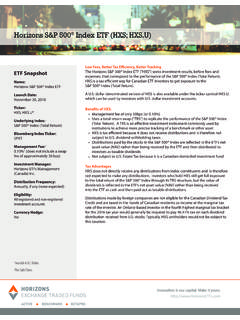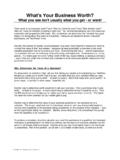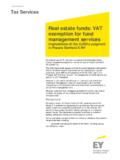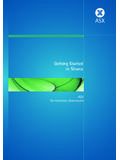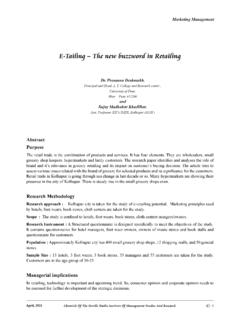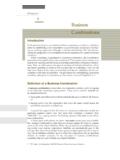Transcription of Horizons NASDAQ-100 Index ETF (HXQ; HXQ.U)
1 Get The Total Return of the NASDAQ-100 IndexThe Horizons NASDAQ-100 Index ETF ("HXQ" ) seeks to replicate, to the extent possible, the performance of the NASDAQ-100 Index (Total Return) (the " Index ) net of expenses. The Index includes 100 of the largest and international non-financial companies listed on the nasdaq Stock Market. A version of HXQ is also available under the ticker symbol , which can be used by investors with dollar investment Features of HXQ Tax Efficiency: HXQ is not expected to make taxable distributions, making it advantageous for taxable accounts where dividends are taxed at the full marginal income tax rate of a Canadian resident Continuous Reinvestment: Net distributions from Index constituents are reflected in HXQ's Net Asset Value ("NAV") on their ex-date (and are reinvested in the Index constituents on an ongoing basis) which can result in more efficient compounding than ETFs that re-invest only quarterly or monthly Direct Exposure to NASDAQ-100 : The Index includes some of the best-known growth companies in the world.
2 Exposure to the NASDAQ-100 Index can complement domestic exposure to Canadian equities, which is heavily weighted towards financials and energy Low Management Fee: HXQ is the lowest-cost NASDAQ-100 Index ETF listed in Canada3 Corporate Class: Tax Efficiency HXQ is a class of shares in a corporate class structure that allows the ETF to deliver its returns in a tax-efficient manner. With this structure, the ETF will receive the total return of the Index (less any withholding tax payable on constituent distributions), which is reflected in the NAV of the ETF. However, investors in HXQ are not expected to receive any taxable distributions from the makes the ETF advantageous, particularly if its shares are held in a taxable account, where tax on dividend distributions - which are not eligible for any dividend tax credit - could potentially be in excess of 50%, depending on the marginal tax rate of the investor.
3 With this ETF structure, investors can potentially defer incurring a tax liability until they sell the ETF, at which point proceeds from the sale of the ETF units would likely be taxed as a capital to all other Canadian ETFs tracking the NASDAQ-100 Index , HXQ has the lowest management fee and MER among a total of 4 ETFs, as at November 30, 2019, and is expected to have the lowest overall cost, which includes the trading expense ratio (TER), as at December 31, 2020, based on current competitor NASDAQ-100 Index ETF (HXQ; )ETF Snapshot Name: Horizons NASDAQ-100 Index ETFL aunch Date:* April 20, 2016 Ticker: HXQ, Manager: Horizons ETFs Management (Canada) Inc. Underlying Index : NASDAQ-100 IndexBloomberg Index Ticker: XNDXD istribution Frequency: Annually (if any)Currency Hedge: NoEligibility: All registered and non-registered investment accounts 1 Trades in Dollars.
4 2 Plus applicable sales is our capital. Make it * The Launch Date shown is the launch date of the predecessor ETF of the same name which was structured as a trust. On November 29, 2019, after receiving unitholder approval, the predecessor ETF merged into a class of shares of a corporate fund structure. In accordance with exemptive relief, any historical data of the ETF presented here includes the historical data of the predecessor ETF in order to provide full and transparent disclosure of the ETF s , management fees and applicable sales taxes all may be associated with an investment in the Horizons NASDAQ-100 Index ETF (HXQ) managed by Horizons ETFs Management (Canada) Inc. (the ETF ). The ETF is not guaranteed, its values change frequently and past performance may not be repeated.
5 The prospectus contains important detailed information about the ETF. Please read the prospectus before Total Return Index ETFs ( Horizons TRI ETFs ) are generally Index -tracking ETFs that use an innovative investment structure known as a Total Return Swap to deliver Index returns in a low-cost and tax-efficient manner. Unlike a physical replication ETF that typically purchases the securities found in the relevant Index in the same proportions as the Index , most Horizons TRI ETFs use a synthetic structure that never buys the securities of an Index directly. Instead, the ETF receives the total return of the Index through entering into a Total Return Swap agreement with one or more counterparties, typically large financial institutions, which will provide the ETF with the total return of the Index in exchange for the interest earned on the cash held by the ETF.
6 Any distribu-tions which are paid by the Index constituents are reflected automatically in the net asset value (NAV) of the ETF. As a result, the Horizons TRI ETF receives the total return of the Index (before fees), which is reflected in the ETF s share price, and investors are not expected to receive any taxable distributions. Some Horizons TRI ETFs use physically replication instead of the total return information contained herein reflects general tax rules only and does not constitute, and should not be construed as, tax advice. Investors situations may differ from those illustrated. Investors should consult with their tax advisors before making any investment , NASDAQ-100 ,and NASDAQ-100 Index , are trademarks of The nasdaq OMX Group, Inc, NYMEX is a registered service mark of New York Mercantile Exchange, Inc.
7 These marks have been licensed for use by Horizons ETFs Management (Canada) Inc. where applicable. The Horizons Exchange Traded Products are not sponsored, endorsed, sold, or promoted by nasdaq and their affiliated companies and none of these parties make any representation, warranty or condition regarding the advisability of buying, selling or holding units shares in the Horizons Exchange Traded Products. All trademarks/service marks are registered by their respective owners. None of the owners thereof or any of their affiliates sponsor, endorse, sell, promote or make any reresenta-tion regarding the advisability of investing in the Horizons Exchange Traded Products. Compwlete trademark and service-mark information is available at learn more, please visit 1119_H Horizons NASDAQ-100 Index ETF (HXQ; )H_0454 Taxation on Equity ETFs The following hypothetical example shows the tax impact on the returns of a Equity ETF that earns annual dividends of This example does not take into account any management or operating fees, or expenses that would be associated with an ETF purchase.
8 Both ETFs are held by an Ontario resident investor in the third-highest marginal tax bracket, who would have an income tax rate of in 2020. It is important to note that neither HXQ, nor any other Horizons TRI ETFs, re-characterize investment income as capital Class ETF HXQP rincipal Investment$100,000$100,000 Market Return (0%)$0$0 Gross Dividends ( )$1,500$1,500 Withholding Tax (15%)$225$225 Net Dividends Received $1275$1275 Pre-Tax Portfolio Value $101,275$101,275 Taxes on Dividends ( )**$ $0 Total Tax Payable$ $0 Total After-Tax Portfolio Value$100, $101,275 Difference in Return $ Lost to Distributions ILLUSTRATIVE PURPOSES ONLY. The above illustrative example highlights the expected after-tax performance benefits of holding HXQ versus another Canadian domiciled Equity ETF in a non-registered account, assuming both ETFs earned/reflected a net dividend yield and track the exact same universe of stocks.
9 This example does not take into account any fees or expenses of the ETFs, or any commissions, fees or expenses that would be associated with a purchase or sale of ETF units/shares. Where a Canadian ETF holds securities, non-resident taxes will be with-held from payments that are subject to withholding taxes (such as most dividends). Depending on the ETF, some Foreign Tax Credit may be passed on to unitholders. No Foreign Tax Credit is contemplated in this example. **Both ETFs are held by an Ontario resident ( citizen) investor in the third-highest tax bracket, who would have a marginal tax rate of in 2020. The example does not contemplate the sale of the ETF units/shares or any tax liability that would result. It also assumes no change in the market value of the Index constituents.


